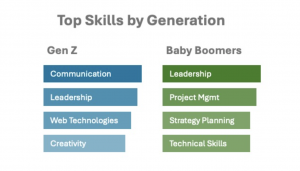
Rhetorik Unveils Landmark Workforce Analysis: Gen Z is Reshaping the Global Workplace
New global data reveals Gen Z's shift toward purpose-driven, collaborative, and tech-centric careers - redefining traditional paths to success
Rather than climbing the corporate ladder, Gen Z professionals are opting for careers that align with personal values, flexibility, and impact. Roles in digital marketing, software development, design, and content creation are seeing disproportionate representation from this cohort. Meanwhile, more traditional paths such as law and general management are seeing a marked decline in Gen Z interest.
Soft Skills Meet Tech Fluency
Among the most cited skills in Gen Z profiles is communication, highlighting the rising value of soft skills alongside technical proficiency. Other top skills include coding, teamwork, design thinking, and AI literacy, underscoring the generation’s adaptability and collaborative orientation.
A Data-Driven View of Global Workforce Trends
Unlike traditional surveys, Rhetorik’s Neuron 360 uses machine learning to analyse real, behavioural career data, capturing inferred age, gender, skill sets, and job roles across 800+ million profiles. This granular, scalable insight provides a high-resolution view of global talent trends across sectors and geographies.
“As data scientists, we thrive on working with datasets that act like lenses into the labour market, where the right question can reveal anything from gender patterns in specialised roles to skill shifts across generations,” said Matthieu Perrodin, Data Scientist at Rhetorik.
Generational Contrasts Across the Board
The analysis underscores stark differences between generations:
- Baby Boomers (61–79) dominate leadership and negotiation-heavy roles.
- Gen X (45–60) bridges traditional management with digital fluency.
- Millennials (29–44) show a hybrid skill set embracing both legacy tools and emerging technologies.
- Gen Z (13–28) stands apart — driven by identity, autonomy, and impact, not hierarchy.
In healthcare, for example, gender dynamics are shifting. More women are entering specialised medical fields, while caregiving and nursing are seeing a rise in male participation — highlighting a move toward more inclusive, emotionally intelligent workplace norms.
Implications for Employers, Educators, and Policymakers
The findings carry major implications for workforce strategy. Legacy frameworks for leadership, advancement, and professional development are being upended. Organisations will need to pivot toward flexible, purpose-led talent models that reflect the values and priorities of a new generation.
The future of work is not on the horizon — it’s already unfolding, shaped by a generation that values purpose over hierarchy, adaptability over tradition, and multidimensional success over linear progression.
To access the full analysis and visual breakdowns, click here.
Francesca Tuohy-Farmer
Rhetorik Ltd
email us here
Distribution channels: Business & Economy, IT Industry, Technology
Legal Disclaimer:
EIN Presswire provides this news content "as is" without warranty of any kind. We do not accept any responsibility or liability for the accuracy, content, images, videos, licenses, completeness, legality, or reliability of the information contained in this article. If you have any complaints or copyright issues related to this article, kindly contact the author above.
Submit your press release
